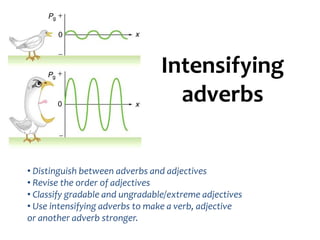
intensifying Adverbs
- 1. Intensifying adverbs • Distinguish between adverbs and adjectives • Revise the order of adjectives • Classify gradable and ungradable/extreme adjectives • Use intensifying adverbs to make a verb, adjective or another adverb stronger.
- 4. Big blue eyes enormous old white fridge amazing red and black painting small old yellowish mirror a little six year old black cat
- 6. Look at the sentences from the interview (1-8). For each sentence, identify the intensifying adverb, the word it intensifies and what type of word (adjective, verb or adverb) this is. 2 I'm very pleased to welcome Swedish architect Jonas Wilfstrand. 3 I must say some of them are absolutely stunning. 4 People are either incredibly short of space or they simply can’t afford a bigger house. 5 When it's time to find new feeding grounds, the Dolgan move house, quite literally. 6 I was impressed by the fact that they're just so simple. 7 As you probably know, Hong Kong is a really overcrowded city. 8 He entirely rethought the way we arrange living space. Look at the words stunning and short in Exercise 5. Which of these adjectives can vary in intensity (gradable)? Which has a meaning that is already intense (ungradable)?
- 7. Gradable or Ungradable? Gradable Ungradable Strong / Extreme
- 8. Rules Extremely / Incredibly + Gradable Absoutely / Utterly / Completely / Entirely / Totally / Quite+ Ungradable Really So
- 9. Gradable adjectives can be measured on a scale, e.g. small: a room can be a more or less small. Ungradable or limit adjectives, on the other hand, are not measured on a scale. They express only extreme qualities, e.g. empty, wonderful. As with adjectives, verbs can be gradable or ungradable. For example, agree and like are gradable. You can agree with or like something to a small or large extent. When used with an ungradable adjective or verb, quite means 'extremely'. The views were quite incredible!
- 10. Choose the correct adverb to complete the sentences. 1. Our house is so / utterly cold at the moment. The heating broke down last week. 2. It's completely / extremely sad that so many people live in just a single room. 3. For ages nothing seemed to be happening on the site and then absolutely / quite suddenly the house went up. 4. I agree with you extremely / completely about the colour of the walls. 5. The price of houses in London is utterly / incredibly ridiculous. 6. It's an entirely / absolutely beautiful apartment. 7. I really / completely want to live in a penthouse apartment in the centre. 8. The design of the house is very / totally clever.
- 11. Choose the correct option. In one sentence, both options are correct. 2. You'd be utterly sensible/foolish to buy that house. 3. I don't agree entirely / extremely with his views. 4. If you could help me to set up the meeting room, I'd be absolutely / extremely grateful. 5. You were quite / incredibly right to complain about the service. 6. I've had a totally tiring / exhausting day at work. 7. Why is this carpet so dirty / filthy? 8. I'm quite / incredibly certain that picture wasn‘t on the wall last time I was here. 9. I really / totally don't want to have this discussion right now. 10. Watching the way the birds built their nest was extremely / absolutely fascinating.
- 12. Stress in intensifying adverbs
Notas del editor
- https://wordwall.net/resource/1187803
